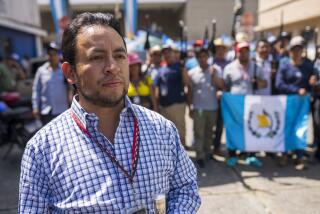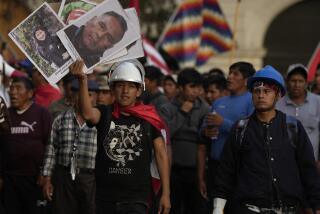Communist Insurgents Frustrate Aquino : Marcos or No, Philippine Rebels Retain Desire to Alter Status Quo
- Share via
IN THE MOUNTAINS OF PANAY, Philippines — Concha Araneta, a Communist rebel leader who has fought for 15 years here in Panay’s rugged mountains, got a letter from home recently. It asked, “Are you staying up there forever?”
Araneta, who grew up in a middle-class family of 12 down the mountain from here in Iloilo City, 290 miles southeast of Manila, read the letter from her sister in a Spartan bamboo house, surrounded by armed men who accompany her on continual guerrilla treks.
“Not forever,” she said, laughing after reading her sister’s question aloud. But she said she won’t budge until the kind of revolution she has in mind takes place.
“My family always asks why I don’t come down and live a normal life, more peaceful,” Araneta, 35,said from a mountain hide-out several hours hike from Iloilo City. “But I say it’s not abnormal. I’ve gotten used to it. And it’s not just me. There are thousands of comrades.”
Marcos Not Enough
She and other rebels said that the ouster of Ferdinand E. Marcos as president in February was not all that they have spent nearly half their lives fighting for.
The rebels frustrate President Corazon Aquino, who took over from Marcos and now seeks a political solution to the 17-year Communist insurgency.
Aquino thought that most rebels would stop fighting once Marcos was gone. But she finds herself facing a seemingly cohesive insurgency of 16,500 armed guerrillas.
With cease-fire talks set to begin soon, the rebels are demanding far-reaching economic and political changes that conflict with many beliefs of the moderates who helped put Aquino in office.
Araneta, who uses Marta as her guerrilla name, said the Communists, with endurance and patience built from hard living in the mountains, can weather any difficulty and emerge victorious.
Aquino says she believes that her government’s solutions will satisfy most rebels but that she does not expect ideologically committed guerrillas to quit fighting.
Araneta leads a far different life than she led with her family.
Surrounded by weapons and watched over by bodyguards, she moves to different mountains every few days, living on dried fish, rice and boiled greens.
Her three children live with relatives elsewhere. She has not seen some of her 10 brothers and sisters in years and spends a good deal of time away from her husband, who also is a guerrilla.
On the several hours’ trek to the safehouse, as Araneta’s hide-outs are called, several of her men told of Communist military successes in the mountains. They mentioned the seizure of weapons and the killing of soldiers and paramilitary troops of the Civilian Home Defense Force.
“On June 20-something, some comrades were able to kill two CHDFs and capture one carbine and one shotgun,” Araneta said later. “The enemy pursued and harassed the red fighters, and two fell.
“The next day, the red fighters were pursued again by two battalions. This time three army men fell, and we had one casualty. So in all we felled five.”
Araneta said she has been captured twice. The second time, in 1979, she was arrested after a difficult childbirth in a hospital on nearby Negros Island. She spent 15 months in prison before she and seven other inmates broke out, she said.
She traces her move underground to 1970, when as a 20-year-old student at the University of the Philippines in Manila she read “Struggle for National Democracy,” the Communists’ ideological underpinning, written by former Communist Party leader Jose Maria Sison. He is now is in Manila after his release from a military prison, where he spent 8 1/2 years.
Araneta and two other top Panay rebel leaders say they are hopeful that negotiations with the government will bear fruit. But their demands indicate that it will not be easy.
The demands include massive redistribution of land to farmers, withdrawal of soldiers from areas where guerrillas are strong, the cutting of close economic ties with the United States, the closing of U.S. military bases and some form of coalition government.
More to Read
Sign up for Essential California
The most important California stories and recommendations in your inbox every morning.
You may occasionally receive promotional content from the Los Angeles Times.










